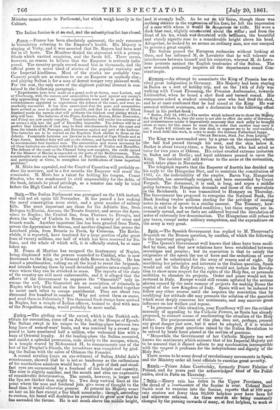ifenagml.—An attempt to assassinate the King of Prussia has ex-
cited great indignation in Germany. His Majesty had been staying in Baden as a sort of holiday trip, and on the 14th of July was walking with Count Flemming, the Prussian Ambasiador, towards Lichtenthal, when he heard a shot fired and turned round. His- companion asked a student standing near who had fired the shot, and he at once confessed that he had aimed at the King He was arrested without resistance, and a declaration to the following effect found in his pocket-book :
"Baden, July 13, 1861.—The motive which induced me to shoot his Majesty the King of Prussia is, that the same is not able to effect the nnity of Germany, and circumstances render it imperatively necessary that such unity be brought about at once; for this cause he must die, in order that another may carry it out. People will ridicule me for this deed, or suppose me to be over-excited; but I must fulfil this work, in order to make the German Fatherland happy.
"OCR BECKER, Stud. Jur. from Leipzig."
The King was unwounded save by a graze on the shoulder, where the ball had passed through his coat, and the skin below it. Becker is about twenty-three, a Saxon by birth, who had acted as- tutor for two years at Odessa. His crime created extreme irritation in Baden and at Berlin; and loyal addresses poured in upon the King. The incident will add fervour to the scene at the coronatian, which takes place in November.
The telegraph reports that the Emperor of Austria has decided on his reply to the Hungarian Diet, and to maintain the constitution of 1861, i.e. the indivisibility of the empire. Baron Vay, Hungarian Chancellor, has accordingly resigned, and been succeeded by Count Forgach. The document, it is said, is long, and urges a middle policy between the Hungarian demands and those of the centralists in the Reichsrath. It was transmitted to Hungary on Thursday. The Government has proposed to recognize the National Bank, the Bank lending twelve millions sterling for the privilege of issuing notes in excess of specie to a similar amount. The Treasury, how-- ever, is said to be in wretched condition; but these reports are in- cessantly spread, and no facts are adduced beyond the circulation of notes of extremely low denomination. The Hungarians still refuse to pay taxes, except under military compulsion,, and the expenditure on the army is very great.






























 Previous page
Previous page